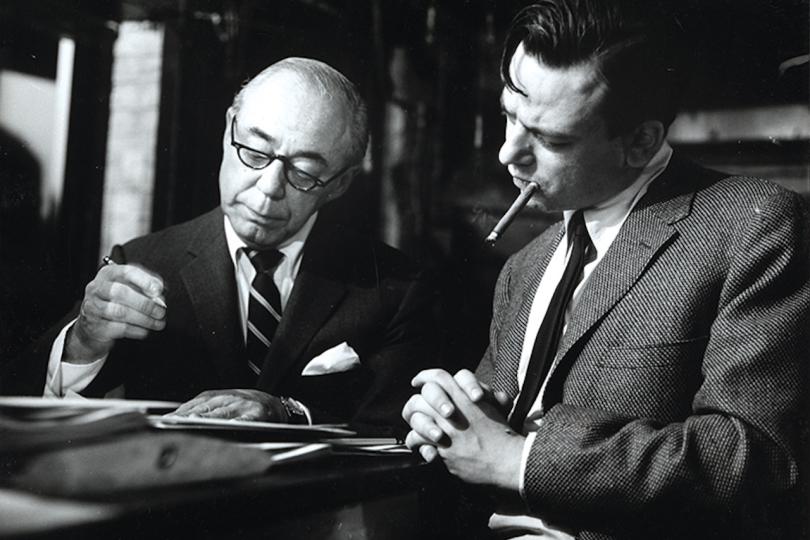Reviving Old Musicals: Rodgers without Hammerstein

Eight months after The Sound of Music had premiered on Broadway, on August 23, 1960, Oscar Hammerstein II succumbed to cancer at the age of 65. Richard Rodgers lost his second long-term collaborator and the theater lost (arguably) its greatest lyricist. When it came to the craft of wordsmithing, Hammerstein was peerless.
Consider the lyrics for “The Gentleman is a Dope”: “A man of many faults, A clumsy Joe who wouldn't know a rhumba from a waltz. The gentleman is a dope. And not my cup of tea. Why do I get in a dither? He doesn't belong to me.” Or, take a look at the metaphors in “A Wonderful Guy.” Nellie Forbush describes herself: “corny as Kansas in August,” “in a conventional dither,” “trite and as gay as a daisyin May, a cliché coming true” who is “bromidic” and “bright as a moon-happy night pourin' light on the dew!” There simply isn’t another lyricist who so cleverly verbalizes the thoughts of his characters.
Without his most successful writing partner, what would Rodgers do? Clearly, the man who’d created 39 Broadway and film scores as well as the music for the documentary seriesVictory at Sea could retire. But Rodgers wasn’t just anybody. Between 1962 and 1979, he produced the scores for five more stage musicals as well as a television production of Shaw’s Androcles and the Lion.
One project that Rodgers started, but didn’t follow through on, was originally titled I Picked a Daisy. Neither Rodgers nor his writing partner, Alan Jay Lerner (working without his usual collaborator, Frederick Loewe) found a beneficial working style. Rodgers dropped out, and Lerner worked with Burton Lane (Finian’s Rainbow, with whom he’d written a few movies) to create On a Clear Day You Can See Forever.
The Sweetest Sounds
In 1962, Rodgers wrote his first lyrics along with beautiful themes for No Strings, which, as the title implies, features no strings. Under Joe Layton’s guidance, this was the first musical to feature an onstage orchestra. Richard Kiley was cast as novelist David Jordan, whose writer’s block leads to a romance with fashion model, Barbara Woodruff, portrayed by singer and actress Diahann Carroll. (Future Guthrie Artistic Director Alvin Epstein was also featured in the cast.) The story centers on Barbara’s attempts to ignite David’s inspiration while he’s more interested in taking her to the Riviera’s romantic hotspots. When he realizes his block will leave if he returns to the U.S., he asks Barbara to go with him, but she chooses her career over romance. Their relationship ends with no strings attached.
The highlight of the score, and the tune that’s become a standard is the opening number, “The Sweetest Sounds” but the remainder of the score is solid and sophisticated, with tunes like “The Man Who Has Everything”, “You Don’t Tell Me” and “Love Makes the World Go” among the most exceptional. Playwright Samuel Taylor has written the story of an adult love affair, not an unfamiliar theme in a Rodgers musical, but this one has more maturity. What set No Strings apart in 1962 was that it’s leading actors had genuine chemistry together.
Would No Strings work for an audience today? With the right actors, director and company putting together a production, it certainly would. For one thing, not having been seen for a long time, a romantic musical set in Paris is a refreshing contrast from that other Parisian musical full of barricades. No Strings is also one of the first musicals to establish the trend of utilizing a small cast. Just an opportunity to hear that remarkable score and see that stylish story unfold onstage could be an enthralling time indeed.
Rodgers and Sondheim
When he as a teenager, Stephen Sondheim and his mother were neighbors of Oscar and Dorothy Hammerstein. Hammerstein took Sondheim on as a protégé, and taught him both wisely and well. Hammerstein lived to see his first successes, West Side Story and Gypsy. It seemed only natural that Sondheim should eventually partner with Rodgers. When Arthur Laurents brought his play The Time of the Cuckoo to them with plans to make it into a musical, the opportunity seemed perfect. Listening to the original cast recording, the score is lovely, filled with lilting melodies and skillful words. For the opportunity of hearing the score alone, the show deserves another chance.
The role of Leona Samish, a spinsterish secretary on vacation in Venice, had been played onstage by Shirley Booth (Hazel on TV) and by Katharine Hepburn in the film Summertime. The story focuses on Leona’s romance with a married Venetian shopkeeper. Retitled Do I Hear a Waltz? this is another neglected musical that can be performed by a small cast singing a sensational score. From the leading lady’s opening number, “Someone Woke Up,” it’s utterly divine and enhances the story. Besides the lilting title song, “What Do We Do, We Fly,” “We’re Gonna Be All Right,” and the romantic “Moon in My Window,” keep the story moving.
Its original 1965 production was conceived as a chamber musical, so perhaps it was too intimate for a Broadway theater. The show refused to come together. For one thing, Rodgers made it known that he was jealous of Sondheim. Neapolitan singer Sergio Franchi was probably the right choice for the male lead, but Elizabeth Allen was miscast, far too young and pretty to play someone having her last fling. Encores! the New York City Center program that stages neglected musicals in concert will stage Do I Hear a Waltz? this Spring and here’s hoping that new generations of theatergoers will embrace it as a forgotten Sondheim in need of discovery. (Leona would be a lovely role for Norah Long or Sally Wingert!)
In 1970, Rodgers teamed once again with director Joe Layton and with Martin Charnin (lyricist for Annie) for a musical treasure titled Two By Two. Based on Clifford Odets’ play, The Flowering Peach, and adapted by Peter Stone, this simple, eight-character show is the story of Noah, his family, the Ark and the flood. As always, Rodgers’ score is tuneful, enhanced by Charnin’s clever, knowing and sometimes naughty lyrics. The songs give every character onstage plenty of opportunity to shine, specifically “Something Somewhere,” “When it Dries,” and the title tune. The most notable, however, is “Hey, Girlie,” a thoughtful love song that Noah croons to his wife Esther as she’s dying.
The show was originally written for film and TV star Danny Kaye (White Christmas), returning to Broadway after 30 years. Kaye broke his ankle during a performance, and his antics when he returned proceeded to wreck havoc on the show. Two By Two managed to run the season and toured with Milton Berle but has rarely been produced since. It requires a minimal production and would be a perfect choice for a Spring slot. Trust in the material and the knowledge that a name like Richard Rodgers should sell tickets are good reasons for Two By Two to be considered for revival.
From Book to Play to Musical
When Rodgers and Hammerstein were producing on Broadway in the 1940s, they financed the first production of John Van Druten’s I Remember Mama. Based on Kathryn Forbes’ collection of stories, Rodgers teamed again with Martin Charnin, (for whom Annie, by this time was a worldwide phenomenon) to create a musical version. An old-fashioned family show, I Remember Mama lasted 14 weeks in the summer of 1979. It didn’t have the appeal of A Chorus Line, Evita or Sweeney Todd, shows audiences were demanding tickets to see that summer, and Swedish film star Liv Ullmann didn’t have enough star power (or vocal training) either.
Still, for the libretto Thomas Meehan (Annie, The Producers) used more of Forbes’ stories than the original play. The story of a Norwegian family’s efforts to maintain their culture in 1900 San Francisco where the matriarch runs the house may not compete with a murderous barber or the first lady of Argentina, but Rodgers always wrote music for strong female characters (Laurey, Nellie Forbush, Maria von Trapp), and Mama Hansen is no exception. Sadly, the score wouldn’t be recorded until eight years after the show had closed. While most of the original cast performed, Sally Ann Howes (Julie Andrews’ replacement in My Fair Lady) sang the role of Mama. Songs like “A Little Bit More”, “Mama Always Makes It Better” and “You Could Not Please Me,” while not first-rate Rodgers, are nonetheless rich and warm.
There’s nothing wrong with I Remember Mama, and any community theater looking for a family show may find Rodgers’ last shout a perfect choice.
Rodgers may not have created masterpieces after Hammerstein’s passing, but he certainly did not retire and rest on his laurels.




